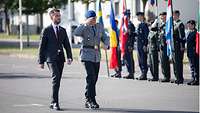Closing Ranks at Ehrenbreitstein Fortress
Closing Ranks at Ehrenbreitstein Fortress
- Date:
- Reading time:
- 2 MIN
Previously, there were two different approaches to the cooperation between the military medical services of NATONorth Atlantic Treaty Organization and EUEuropean Union. On 3 September 2019, the most senior representatives of the medical services from 14 nations signed a declaration aimed at combining both approaches.
The declaration of Initial Operational Capability (IOCInitial Operational Capability), of the Multinational Medical Coordination Centre/European Medical Command (MMCCMultinational Medical Coordination Centre/EMCEuropean Medical Command) marked the actual go-ahead of cooperation. "The event is so important because with their signature the most senior representatives of the medical services document their attachment and commitment to this important project of the medical services of NATONorth Atlantic Treaty Organization and EUEuropean Union", said Brigadier, Medical Corps, Dr Stefan Kowitz, Director MMCCMultinational Medical Coordination Centre/EMCEuropean Medical Command.
MMCCMultinational Medical Coordination Centre/EMCEuropean Medical Command
MMCCMultinational Medical Coordination Centre/EMCEuropean Medical Command serves as connecting link between NATONorth Atlantic Treaty Organization and EUEuropean Union. Since its setup in December 2017, the multinational centre has been tasked with coordinating the medical capabilities of the different nations. Also, the different requirements on medical operational forces must be harmonised in accordance with NATONorth Atlantic Treaty Organization, EUEuropean Union and UNUnited Nations mandates so as to be able to be equally ready for all mandates. In the future, MMCCMultinational Medical Coordination Centre/EMCEuropean Medical Command will also offer services in the fields of patient flow management and medical logistics.
Round table
Although the "round table" in the "Kuppelsaal" (domed hall) of Ehrenbreitstein Fortress was rectangular, it definitely had a signalling effect. The participating nations shall fill with life the MMCCMultinational Medical Coordination Centre/EMCEuropean Medical Command located in Koblenz as equal partners. Beside the German elements, the multinational element of MMCCMultinational Medical Coordination Centre/EMCEuropean Medical Command so far consists of a Dutch and a Norwegian liaison officer, a French liaison officer will join in the course of 2020. After achieving Initial Operational Capability, the build-up of MMCCMultinational Medical Coordination Centre/EMCEuropean Medical Command will continue by the assignment of further liaison officers of the participating nations.
Formal confirmation
In a military ceremony performed at the Koblenz Rhine Barracks on 4 September, IOCInitial Operational Capability was formally confirmed and declared in the presence of the representatives of the 14 participating nations and numerous guests. Witnessed by the representatives of the participating medical services, the Deputy Surgeon General of the Bundeswehr, Major General, Medical Corps, Dr Stephan Schoeps declared Initial Operational Capability of the MMCCMultinational Medical Coordination Centre/EMCEuropean Medical Command. Subsequently, the Chief Mayor of the city of Koblenz also addressed the multinational representatives and visitors to the ceremony.
Together we are strong
The presence of the most senior representatives of the participating nations underlines the significance of this project. 90% of the EUEuropean Union citizens are living in a country that is member to NATONorth Atlantic Treaty Organization. Major General, Medical Corps, Dr Stephan Schoeps concluded by underlining the significance of the MMCCMultinational Medical Coordination Centre/EMCEuropean Medical Command, saying that the resulting collective security needs require the promotion of interoperability between these states, for "together we are strong".







